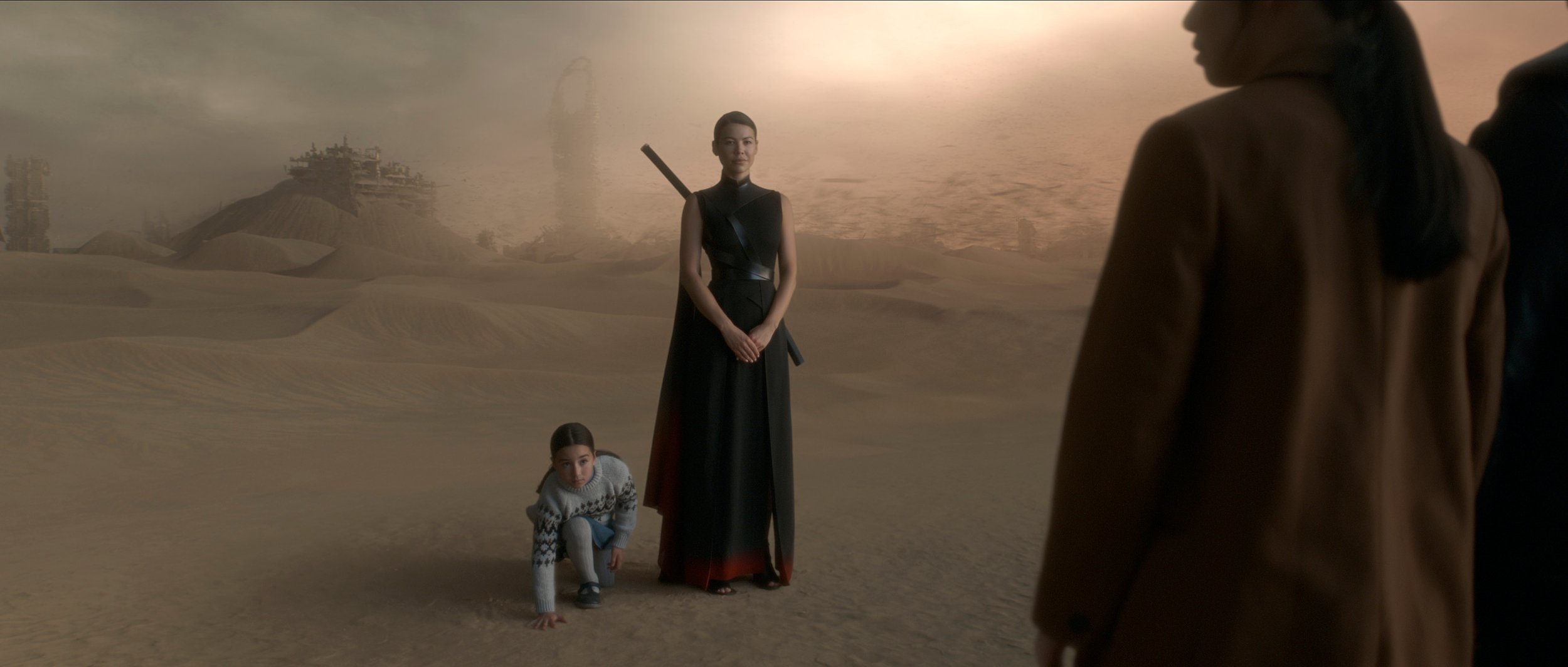Sea Shimooka Unlocks the 3 Body Problem
Mixed Asian Media - May 7, 2024
By Angela Wong Carbone
Powered by JoySauce
Photo credit: Ed Miller, courtesy of Netflix
Sea Shimooka is no stranger to incredible, rigorous transformations. From her work on The CW’s Arrow to her new show, Netflix’s 3 Body Problem, the actress and director has become an expert in wielding deadly weapons and sinister side-eye. Shimooka spoke with MAM to unpack her mysterious character, Sophon, and her hopes to expand mixed-Asian representation in media to come.
*THIS ARTICLE CONTAINS SPOILERS FOR SEASON 1 OF THIS SHOW AND HAS BEEN EDITED FOR CLARITY AND LENGTH.
Interview
You’ve run the gamut of playing badass women in various stunt-heavy roles. What was it like to read for Sophon and what were your initial thoughts on the role?
Reading for Sophon was a trip. The role was originally titled “Woman of the Apocalypse” on the audition sides. Super cool but also quite daunting. I was on location in Berlin, late for a camera test, trying to tape in my stuffy, no-AC hotel room in the middle of summer. I actually almost didn’t audition because I was so stressed prepping for my film [Berlin] that I was about to direct but I loved [creators David Benioff, D.B. Weiss, and Alexander Woo’s] work so I gave it a go.
Then I heard a few weeks later that they wanted me to read again. Casting Director Robert Sterne of Nina Gold’s office was kind to give me notes and work on them before the audition and at the end of our session he told me there was nobody else they were considering for the part. That was very encouraging but also meant I was the only one who could fuck this up so I needed to strangle my inner saboteur.
I got on the Zoom and creators Dan and David were calling from a cab that was weaving through the streets of London. They were bouncing up and down in their video feed which made the whole thing hilarious. Alex Woo, our other fantastic showrunner, invited me to get coffee at the end of the call. I didn’t know what that meant exactly but then I got the offer an hour later and almost had a heart attack in my living room.
Your character arguably has the most mysterious arc in the series. Without giving up too much, what was your process like shaping that character and how did you navigate her development throughout the show?
I primarily focused on her calm demeanor and how that manifests physically in her voice and body. I did specific vocal warmups to get to this resonant place in my voice which felt right for her. That voice needed to sound inviting but also intimidating so I played with levels of those qualities as the season progressed. I also tried to differentiate the two ways in which we hear her. In the VR game, she serves as a stand-in for the San-Ti, sharing their story and impending predicament with conviction as her words are generated by code. In the scenes with Evans, he is speaking directly to the San-Ti via the sophons. Through the speaker on the Judgement Day, I wanted there to be a curiosity in the disembodied voice.
Here, the San-Ti don’t have all the answers — they’re learning and trying to understand. The San-Ti have become God to a cult on Earth. Since we never see the San-Ti, I had to find a way to embody her that gives those followers something to look up to. A lot of the heavy lifting was done by our genius writers to achieve this: Sophon walks on lava like Jesus walks on water or floats down from the heavens. Physicality-wise, I had to nail her intentional movements and gracefulness which was a challenge in four-inch heels but I got there.
Photo credit: Ed Miller, courtesy of Netflix
What was it like working with such well-loved showrunners and creators on such a different concept? Did the process meet expectations?
I was a Game of Thrones fan so knowing what they were capable of was both anxiety-inducing and exciting. I got a sense of them on the Zoom calls but they were even more easygoing in person. I think I didn’t realize how funny they were. They have this dry sense of humor that will get you every time. All three of them are big-hearted nerds who love the books so much and put so much consideration into every second of television they make. They really tried to make these challenging books accessible to the masses while also satisfying the book readers by including the big ideas from the novels. It’s infectious to work with such passionate people.
Working on this was like nothing else I’ve ever worked on. Network shows film so many scenes a day. This show, at least the scenes I filmed, would shoot one scene a day. Sometimes the same scene over two days. The scenes were, of course, very intricate — I can’t tell you how many angles they would get (I’m obsessed with the giant Technocrane) but this also allowed time for the performances to breathe.
Mixedness can feel like both a superpower and, at times, a limitation. How do you feel your mixedness has influenced your career?
I love being mixed. I’ve booked roles because of my mixedness — Arrow’s Emiko Queen had a Japanese mother and white father. I think when I was younger I would blame not getting parts on being so hard to cast, never fitting nicely in the diversity box by being enough of whatever race they were looking for.
But as I’ve gotten older and grew as an actor, I now know that those roles weren’t meant for me but rather meant for someone whose background was more in line with that character. I understand now that being an actor is like being a puzzle piece and sometimes you’re auditioning for the wrong puzzle but there will be another puzzle that comes along that needs your multi-colored puzzle piece to be completed so you just have to be patient and enjoy the ride.
Photo courtesy of Netflix
What would you like to see more of in the representation of mixed-Asian folks on screen?
Culturally specific Asian stories are important and it feels like these stories are just starting to be told, at least in a mainstream way. There also needs to be more Asian stories that are inclusive of mixed-Asian folks, too. There just aren’t enough Asian stories being told in general. I am happy to see a lot of mixed-Asian filmmakers out there, myself included, so hoping we all have a chance to have our projects made one day and create some opportunities for mixed-Asian actors.
End of Interview
If you haven't already, Shimooka recommends reading the book the Netflix series is based on — The Three-Body Problem* by Cixin Liu. Season 1 of 3 Body Problem premiered on Netflix on March 21, 2024, and is streaming now.
*Disclosure: As an affiliate of Bookshop.org, MAM will earn a commission if you click through and make a purchase.
Angela Wong Carbone (she/her) is a decorated actor and writer. Her writing has been recognized by AT&T Hello Lab, Hillman Grad’s mentorship program, The Gotham, Slamdance and others. Raised in New York by an immigrant Chinese mother and Italian American father, Wong Carbone’s personal curiosity toward identity saturates her writing and she has contributed to Eileen Kelly’s Killer and a Sweet Thang and Lulu Gioiello’s Far Near. As an actor, Wong Carbone has starred in NBC’s Chicago Med, AppleTV+’s WeCrashed and IFC Films’ Resurrection. In 2020, she was selected for the 19th annual ABC Talent Showcase. Wong Carbone holds a degree in architecture from Cornell University and makes a mean lasagna.
JoySauce is a multimedia network dedicated to celebrating the full spectrum of Asian American and Pacific Islander narratives. The site boasts a vibrant library of content around entertainment, lifestyle, food, travel, culture, relationships, art, and education in the form of exciting new streaming shows, movies, standup comedy, provocative podcasts, and a suite of editorial updated daily.




